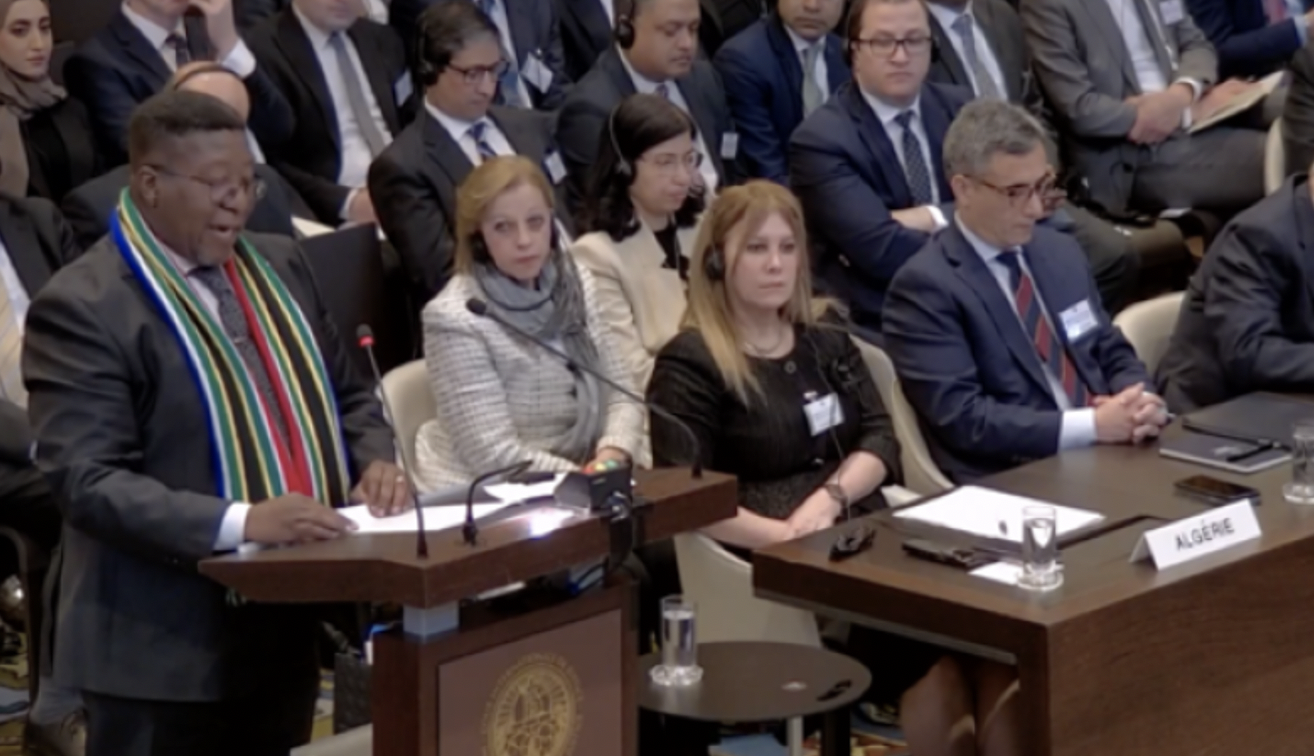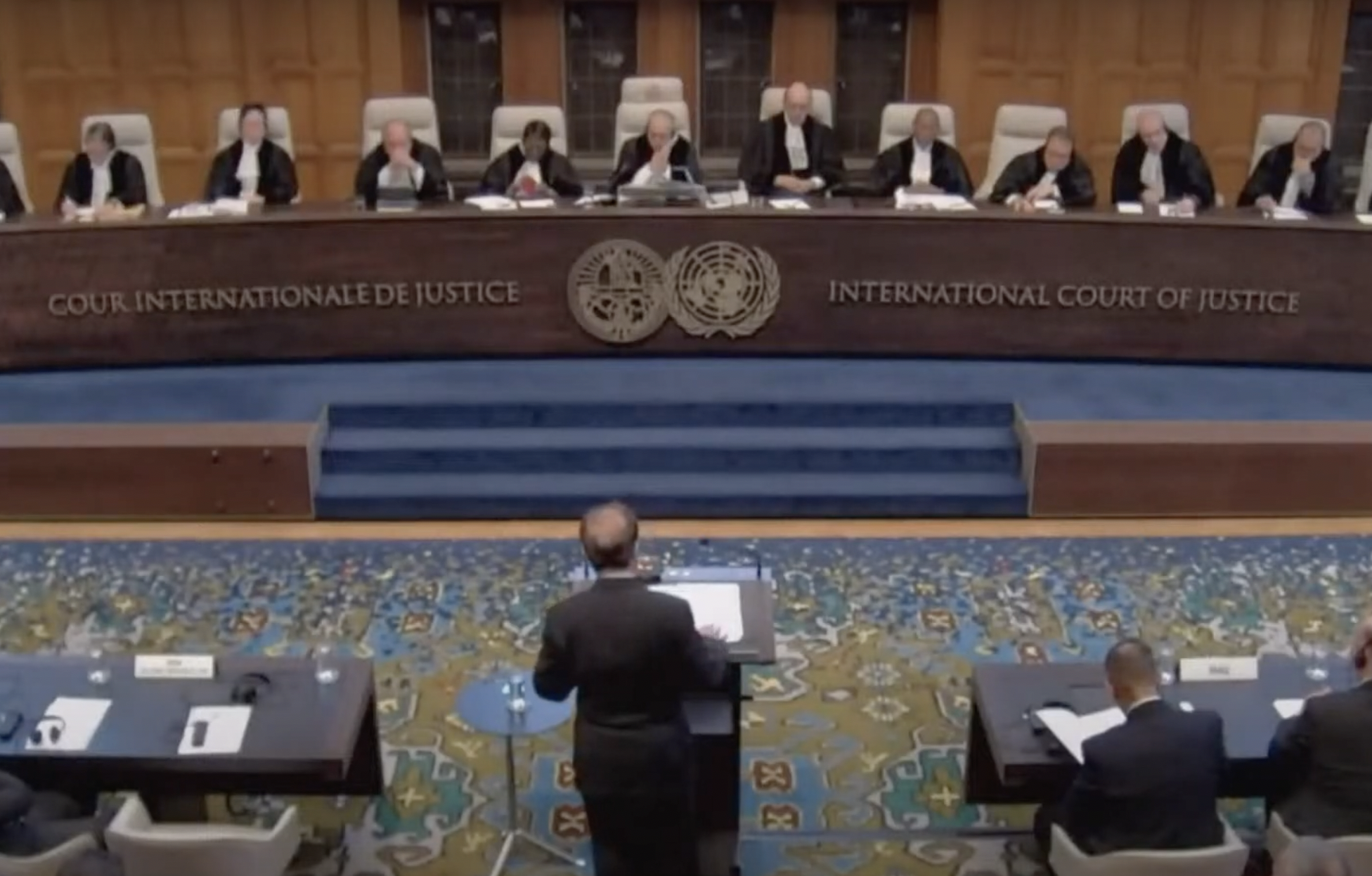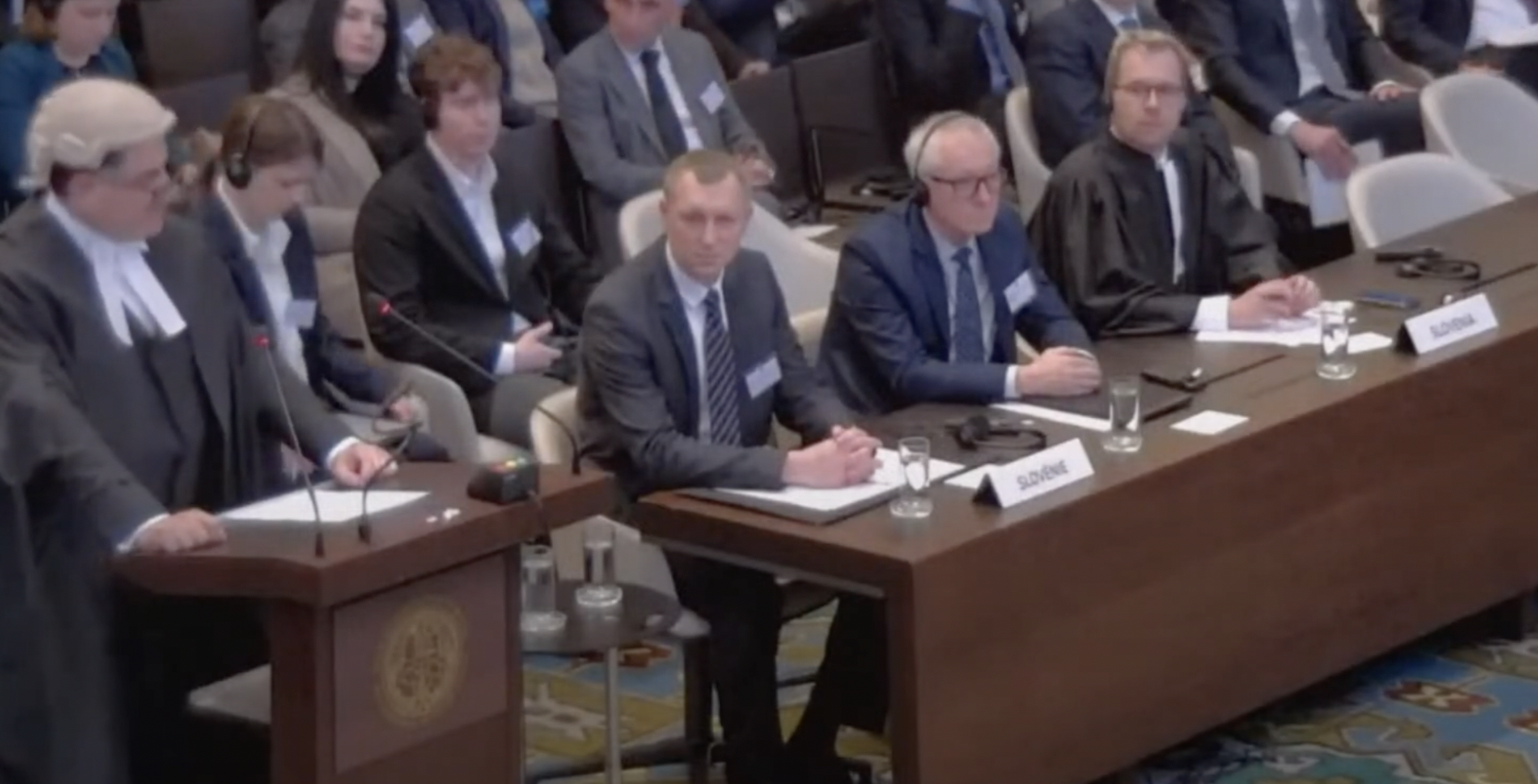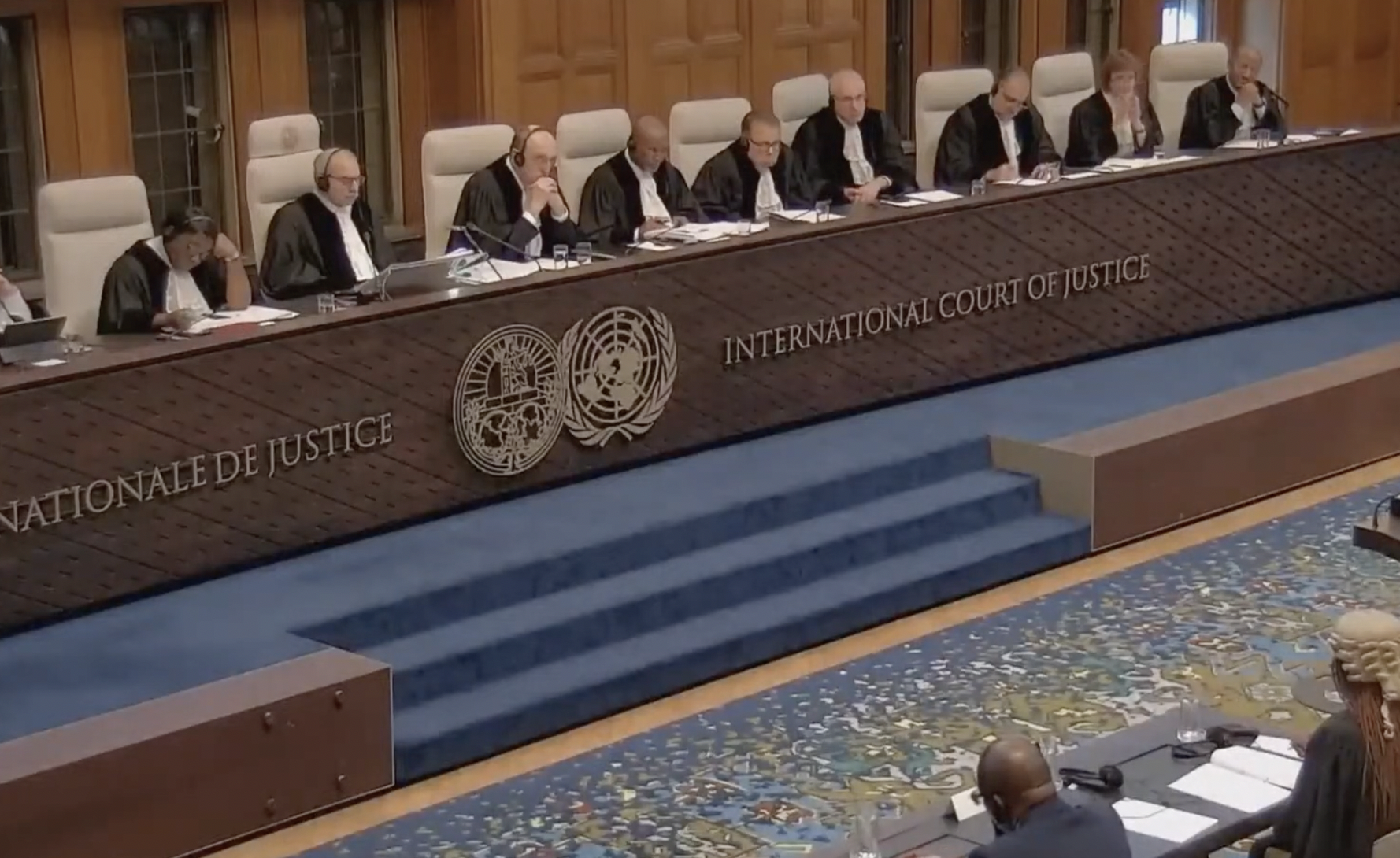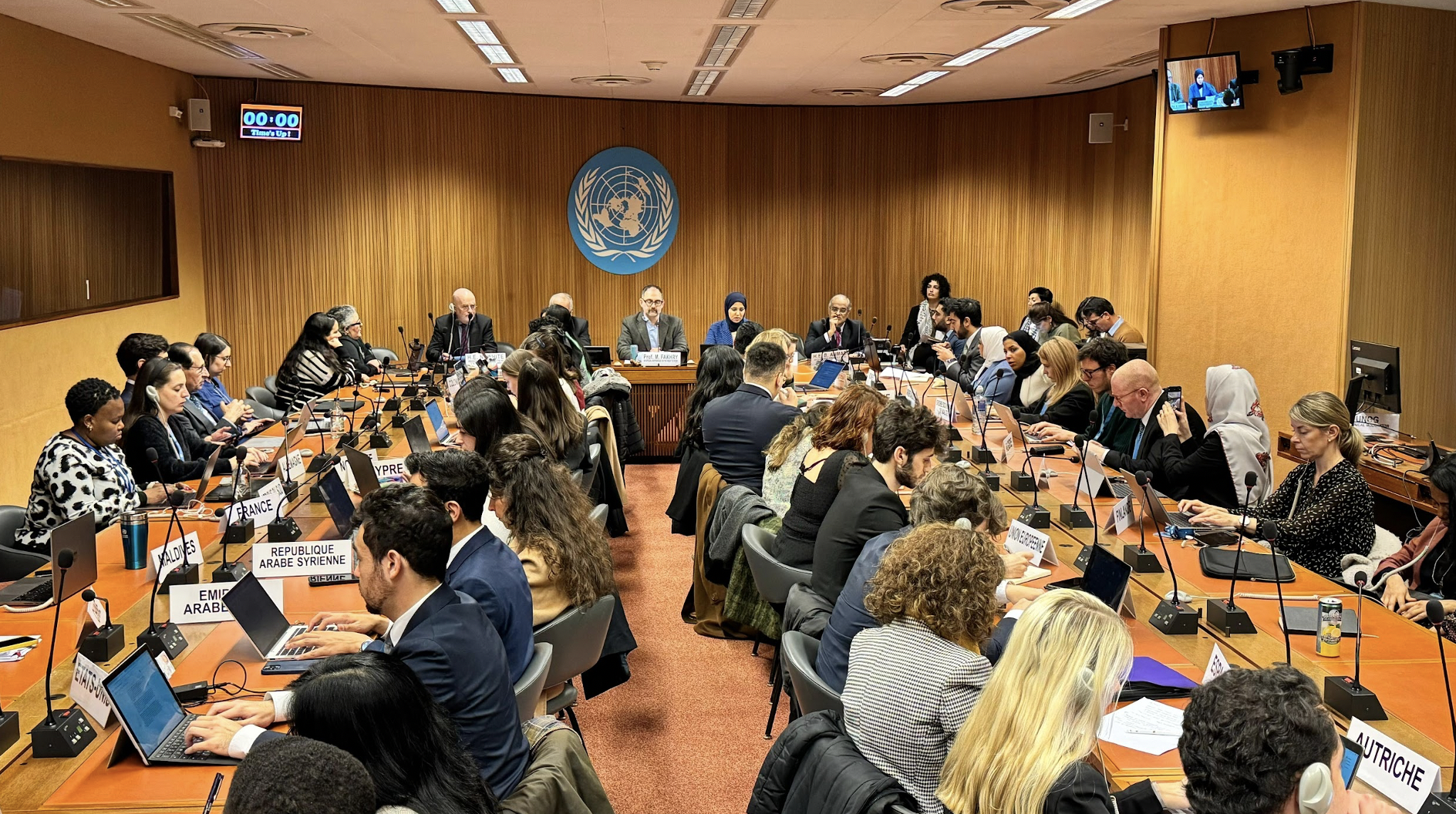The International Court of Justice (ICJ) holds public hearings in the advisory proceedings - State of Palestine
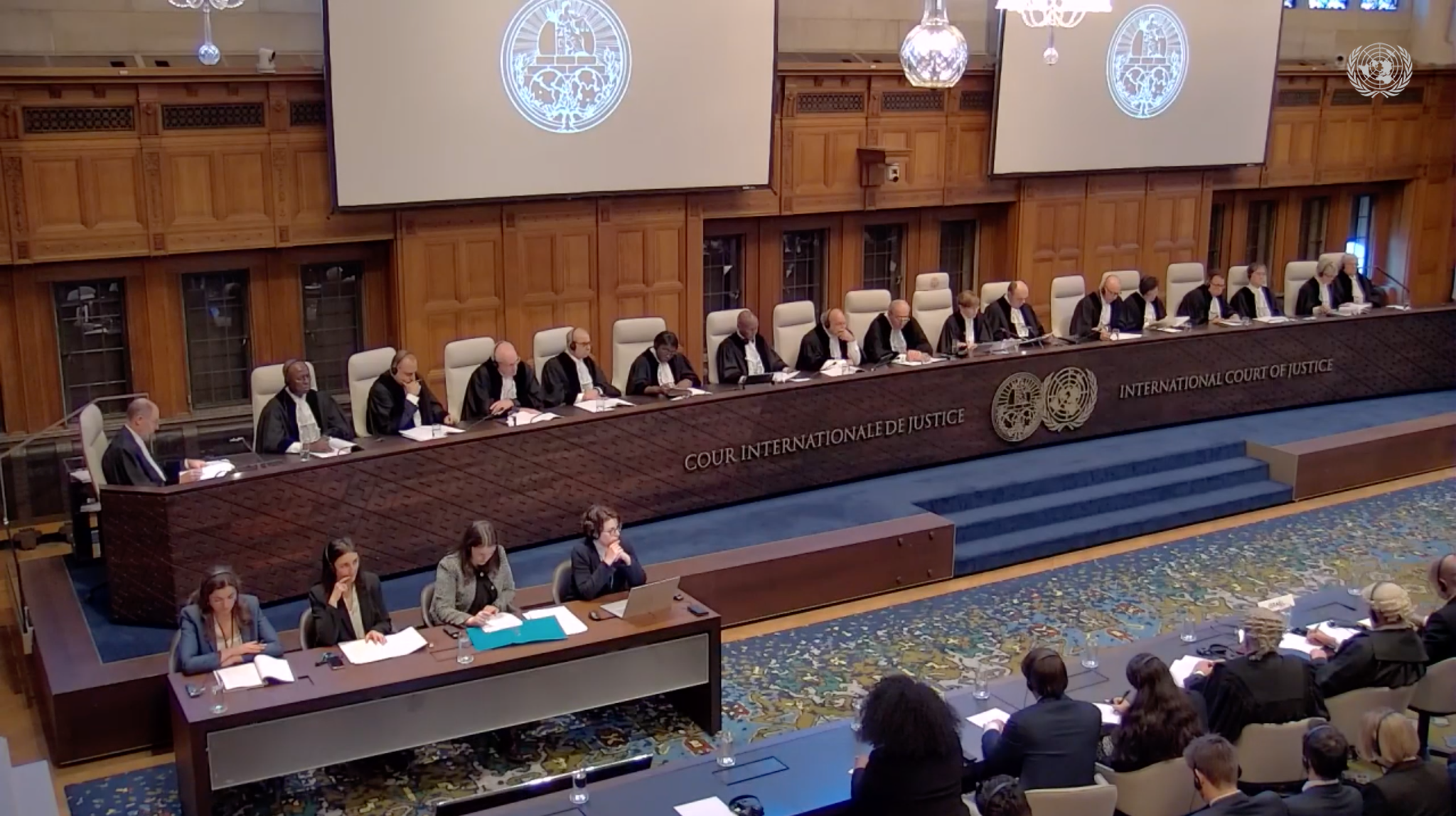
On 19 February 2024, the International Court of Justice (ICJ) rendered its second advisory opinion in two decades, responding to a request from the United Nations General Assembly (UNGA) regarding issues concerning the occupied Palestinian territory. The ICJ, inter alia, grappled with the following questions:
"(a) What are the legal consequences arising from the ongoing violation by Israel of the right of the Palestinian people to self-determination, from its prolonged occupation, settlement and annexation of the Palestinian territory occupied since 1967, including measures aimed at altering the demographic composition, character and status of the Holy City of Jerusalem, and from its adoption of related discriminatory legislation and measures?” and “(b) How do the policies and practices of Israel referred to in paragraph 18 (a) above affect the legal status of the occupation, and what are the legal consequences that arise for all States and the United Nations from this status?".
The hearings, taking place from February 19 until February 26, will observe 52 states presenting arguments on the legal consequences of Israel's occupation of the Palestinian territories.
Palestine
Palestinian foreign Minister Riyad Al-Maliki’s statement began by emphasising the multifaceted and atrocious humanitarian situation that Palestinians face, underscoring the pervasive challenges they endure. Minister Al-Maliki stated that “2.3 million Palestinians in Gaza, half of them children, are besieged and bombed, killed and maimed, starved and displaced.” he proceeded by adding that “more than 3.5 million Palestinians in the West Bank, including east Jerusalem, are subject to colonisation of their territory and the racist violence that enables it”. He also mentioned the 1.7 million Palestinians treated as second class citizens and the seven million Palestinian refugees that continue to be denied the right to return. While this is the reality Palestinains have to live with, Israel offers them three options: displacement, subjugation, or death. He added that the UN promised in its charter that all peoples have the right to self-determination and vowed to eliminate colonialism and apartheid worldwide. However, Palestinians have been deprived of this right for decades.
The Palestinian foreign minister proceeded to show the court five maps .The first one was the map of historic Palestine – the territory, he said, where the Palestinian people should have had the right to decide for themselves. The second map displayed the 1947 UN Partition Map, which, according to al-Maliki, ignored the wishes of Palestinians. The third map illustrated that three-fourths of historic Palestine became Israel from 1948 to 1967. “From the first day of its occupation, Israel started colonising and annexing the land with the aim of making its occupation irreversible.
He also added a fifth map that was presented by Netanyahu at the UNGA described as "the new Middle East”. “There is no Palestine at all on this map, only Israel comprising all the land from the Jordan River to the Mediterranean Sea," said al-Maliki. “This shows you what the prolonged, continuous occupation of Palestine is intended to accomplish: the complete disappearance of Palestine and the destruction of the Palestinian people”. According to al-Maliki, Israel's intentions have been unmistakably clear and publicly acknowledged, constituting grave violations of the most fundamental norms of international law. He finalised by stating that “we [the Palestinian people] seek peace which can only be rooted in Justice”
Legal Determination
The second speaker, professor Andreas Zimmerman addressed the court on the legal Determination Regarding The General Assembly’s questions. As previously stated, UNGA, under Article 69 of its chapter, has submitted questions to the court seeking a legal determination regarding the ongoing conflict between Israel and Palestine. These questions pertain to serious breaches including human rights violations, denial of self-determination, and racial discrimination. The court's legal determination is essential to address the legal consequences of these breaches. Zimmerman stated that the court is urged not to decline the requested opinion, as there are no compelling reasons to do so, adding that Israel has consistently refused to engage in meaningful negotiations with Palestine based on international law and United Nations resolutions. Despite repeated calls by the Security Council for a solution consistent with international law, Israel has maintained its stance of tolerating only one state - Israel - between the Mediterranean Sea and the Jordan River. This position has been reflected in concrete policy decisions and measures on the ground, including rejecting attempts for meaningful negotiations.
Professor Andreas Zimmerman stated that Israel breaches international law by violating the prohibition against acquiring territory by force, practising racial discrimination and apartheid, and denying Palestinians the right to self-determination. It is crucial to recognize that the United Nations has a continuous responsibility to resolve the question of Palestine satisfactorily in all its aspects.
Subsequently, legal representative Paul Reichler took the floor to address the legality of Israel’s prolonged occupation, annexation and settlement of the occupied Palestinian territory. His presentation identified the elements that determine whether, and in what circumstances, a belligerent occupation is, or becomes, unlawful under international law. He also reviewed the evidence to assess the presence of these elements. “I will show that based on the applicable and the well-established and undisputed facts Israel’s 56-year occupation of Palestinian territory is manifestly and gravely unlawful and that international law requires that it be brought to an end completely and unconditionally,” he stated.
Permanent Character of Israel’s Occupation of Palestine Territory
Reichler examined Israel's prolonged occupation. According to international law, occupation is considered a temporary situation where the occupying power must maintain the status quo and refrain from making permanent changes to the territory. This principle has been reaffirmed by various resolutions, including General Assembly Resolution 77/126. As part of the evidence he stated that the majority of states have agreed to the principle including, but not limited to, Switzerland's statement which emphasises that the occupation is inherently temporary and requires the occupying power to respect the territorial integrity of the occupied territory.
Out of 35 states and international organisations who submitted written statements on the legality of Israel’s occupation, only two of them argued that the occupation is not unlawful – the United States and Fiji. Reichler discussed how the U.S. protects Israel from legal consequences, stating "the only state besides Fiji to defend Israel is the U.S." He observed that regardless of Israel's actions violating international law, the US consistently steps in to shield it from accountability. The US does not argue that Israel's occupation is legal; instead, it contends that it falls into a grey area where it is neither legal nor illegal. The US supports this stance by asserting that international humanitarian law, rather than the UN charter or general international law, exclusively governs belligerent occupation.
Israel's occupation of Palestinian territory for over 56 years is deemed unlawful due to its permanent character. Israel has established de facto control over the West Bank and considers it as part of its sovereign territory. The presence of over 700,000 Israeli settlers in the occupied territory, along with official statements and documents expressing Israel's intention to incorporate the territory into Israel, further reaffirm the permanent nature of the occupation. Furthermore, legal representative Paul Reichler underscored that Israel has annexed East Jerusalem and maintains it as its capital – which is in contradiction to international law. Additionally, it has facilitated the establishment of over 465,000 Israeli settlers in the West Bank, with the intention of permanently altering the demographics of the region. These actions violate international law prohibiting the acquisition of territory by force and the transfer of civilian populations into occupied territory. Israel has violated several resolutions, including Resolution 76/80, Resolution 478/80, and Resolution 2334/16. He finalised his statement by quoting Palestinian poet Mahmoud Darwish, “‘In silence, we become accomplices’ but he assured us, when we speak, every word has the power to change the world”
Israel’s Persecution, Racial Discrimination, and Apartheid Against the Palestinian People
Since the Nakba in 1948, Israel has implemented discriminatory legislation and measures, creating a deep rooted system of racial discrimination against Palestinians. According to the next speaker, Dr. Namira Negm, discrimination against Palestinians is as essential to Israel's prolonged occupation as annexation and colonisation of Palestinian territory. These aspects are intertwined components of the same oppressive structure. Palestinians face alarming levels of human and material losses, enduring ongoing injustices. Negm highlighted that, in the eyes of Israel, Palestinians are automatically considered guilty. This perspective manifests in a staggering 99 percent conviction rate for Palestinians tried before Israeli military courts. Conversely, settlers rarely face prosecution for crimes against Palestinians, enjoying absolute impunity. Despite calls from the UN Security Council for Israel to disarm settlers, their violence persists, often supported by the Israeli government and military.
‘Apartheid exists in occupied Palestinian territory’
Negm stated that Israel’s policies and practices in the occupied Palestinian territory meet the legal standards to describe the situation as apartheid, emphasising that victims of apartheid South Africa and Namibia, among other countries, hold the view that apartheid exists in the occupied Palestinian territory: “first, the existence of two or more different racial groups is present. Second, the establishment of an institutionalised regime of systematic oppression and domination by one racial group over another undoubtedly exists. Third, the commission of inhumane acts is endemic. Finally, the inhumane acts are committed with the purpose of maintaining the apartheid regime and by it, maintaining permanently Israel’s illegal occupation of Palestinian territory.”
Violation of the Palestinian people’s Right to Self-Determination
Professor Philippe Sands affirmed that there is universal acknowledgment of the Palestinian people's right to self-determination, as no participating country, including Israel, contests this entitlement under international law. Sands emphasised three fundamental propositions advanced by the state of Palestine, underscoring the distinctiveness of the Palestinian people and their entitlement to the same rights as all other nations. These rights include the crucial right to self-determination, encompassing the authority to shape their political, social, and economic structures within the framework of international law. Sands stressed that the Palestinian people's right to self-determination is not merely symbolic but carries tangible implications, including sovereignty over their land and resources, protection from external demographic manipulation, and the prerogative to determine their political status and economic development.
In his concluding remarks, Sands reiterated the illegality of the occupation and called for its immediate, unconditional, and total cessation. He asserted that all UN member states are legally obligated to terminate Israel's presence in Palestinian territory. Furthermore, Sands underscored the court's affirmation of the Palestinian people's right to self-determination, emphasising that this right is not subject to negotiation. Through these statements, Sands underscored the imperative of upholding international law, ensuring justice for the Palestinian people, and acknowledging their inherent right to shape their own destiny without external interference.
Consequences of Israel Breaches
Professor Alain Pellet's crucial remarks centred on the issue of compensation and reparations owed to Palestine by Israel, highlighting the need for accountability and redress for the injustices suffered. Pellet underscored that both the Security Council and the General Assembly have issued legally binding findings affirming Palestine's entitlement to compensation. In light of this, Pellet urged the UN and other relevant parties to ensure certain guarantees, including refraining from providing any military or technological support that could perpetuate Israel's occupation and its discriminatory regime in the occupied Palestinian territories. Additionally, Pellet emphasised the importance of aiding and supporting the Palestinian people, including refugees affected by recent Israeli actions, such as those assisted by UNRWA. Pallet stressed the necessity of refraining from engaging in economic or other relations with Israel involving the population or natural resources of the occupied Palestinian territories without the explicit consent of a legitimate representative of the Palestinian people. Through these directives, he stated the imperative of upholding justice, dignity, and sovereignty for Palestine while holding Israel accountable for its actions. He finalised by stating “all these violations have been brought about by the prolonged occupation of Palestine, which is surely the mother of all its violations. Your opinion, distinguished members of the court, will be a very precious guide for Palestine.”
Closing Statement
Riyad Mansour, with visible emotion, concluded the first hearing by emphasising the profound significance of the court's potential determination regarding the illegality of the occupation and its legal ramifications in bringing it to an immediate end, thereby paving the path for a just and lasting peace. He appealed to the court to guide the international community in upholding international law and ending injustice, envisioning a future where Palestinian children are treated with dignity, where identities do not diminish human rights, and where both Palestinians and Israelis live without fear of violence. Mansour pointed out that the Palestinian people seek only respect for their rights, affirming that the future of freedom, justice, and peace can begin in the present moment.
Geneva International Centre for Justice (GICJ) acknowledges the importance of the ICJ's public hearings in the advisory proceedings regarding the Occupied Palestinian Territory. These hearings represent a crucial step towards addressing the ongoing violations of international law in the OPT. GICJ urges the ICJ to carefully deliberate the evidence presented, emphasising the need for a clear and unequivocal determination regarding the unlawfulness of Israel's actions and the legal obligations of all states to uphold international law. As advocates for justice and accountability, GICJ calls upon the international community to support the ICJ's efforts in seeking a just and lasting resolution to the Palestine question that respects the rights and dignity of the Palestinian people.
Read more from GICJ:
#Geneva4Justice #GenevaInternationalCentreforJustice #Israel #Palestine #OccupiedPalestinianTerritory #IsraeliOccupation #InternationalCourtofJustice #ICJ




